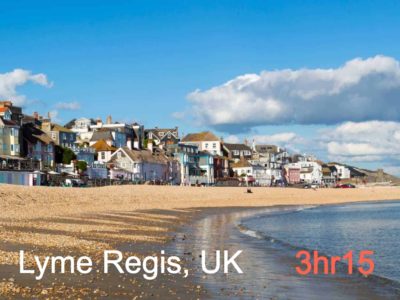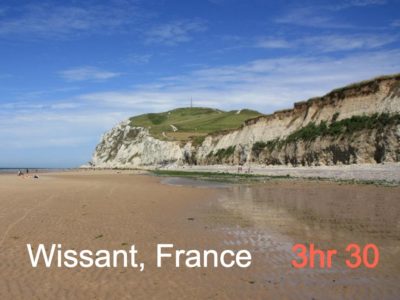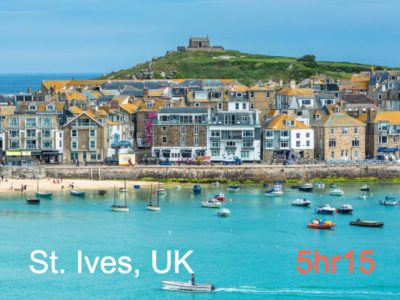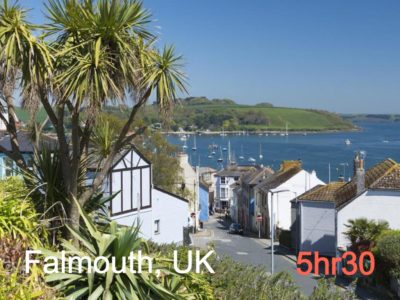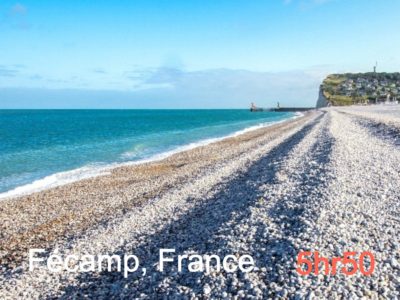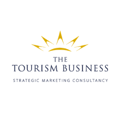The French Connection

Even before the global pandemic, domestic tourism was set to grow over the next four years, owing to Brexit. A weaker pound and more complicated travel arrangements indicated that even a shiny new blue passport wasn’t going to compel quite as many of us to travel abroad as in previous years. And although Brexit issues are looming again, they still seem quite insignificant while the world is gripped with travel restrictions and fear.
This got me thinking, with domestic tourism set to grow, there are obviously going to be significant challenges for international travel, But challenges always come with opportunity if you know where to look, and I believe this opportunity lies with visiting our neighbours.
This article is written from the perspective of visiting France, but the concepts and strategies would be equally apt for travel from the UK to any nearby European countries including Belgium, Denmark, Holland, Germany and Norway.
A special relationship
We’ve always had a slightly special relationship with France compared with our other European friends.
- We’re close neighbours.
- We share a rich ancestry.
- We built a tunnel under the sea together.
And there’s an opportunity right now to build a significant tourism bond beyond what we’ve usually had.
Many of us have visited France and do so on a regular basis, but compared to what British tourism numbers to France could be, there’s still a lot of room for growth..
The fact is, there is an obvious and immediate solution for our holiday worries this year and it’s reacquainting ourselves with our own fair isles. And whilst I am a staunch advocate of domestic tourism, the simple fact is, this is quickly going to become overwhelmed.
Firstly, many of our tourism providers might well go out of business, from attractions to accommodation providers to restaurants, and therefore there may well be reduced capacity to handle the sudden influx once quarantine is lifted.
Secondly, the demand is going to be significantly higher than previous years, and in the popular areas of Devon and Cornwall, it can be pretty crowded at the best of times during summer and other holiday periods.
Thirdly, travelling to our southwest England destination, on first glance might seem straightforward, but the dreaded A30 towards Cornwall could potentially get near unbearable for many drivers, crawling along at a snail’s pace, and this is before we’ve got on to our single lane roads for the final 12-40 miles of the journey, depending on where you are going. Google maps might tell us it will take 5 hours from London to Cornwall, but I’ve spent 6 hours going from Bristol to Devon before thanks to the M5, and so I believe while the romantic view of a gorgeous domestic holiday is high up in people minds at the moment, I feel news stories about choked roads and overcrowding will very quickly surface and the reality will set in quickly.
Enter France – a fantastic alternative to the ‘local’ domestic holiday.
So what’s stopping us?
Bearing in mind, the potential limited hospitality capacity, the relatively small space of the beach frontage in Devon and Cornwall (compared to some huge European beaches), parking limitations, and the capacity of roads, why do so many of us continue to travel to the Southwest, rather than heading South / East into France?
Distance
We feel that France is much further away than it is. So, it’s potentially closer than some of the domestic hot spots we head to, but droves of us head to Southwest England rather than nipping across the border. Why is this?
Simply put, we perceive it to be easier to travel within our own borders than to travel next door. Even if, in many cases, it will take us longer to get to our domestic destinations rather than an equivalent in France.
| Beach | Location | Travel time from London |
| Lyme Regis | UK | 3hr 15 |
| Wissant | France | 3hr 30 |
| Sangatte | France | 3hr 30 |
| Boulogne-sur-Mer | France | 3hr 49 |
| Le Touquet-Paris-Plage | France | 4hr 00 |
| Plymouth | UK | 4hr 15 |
| St Ives | UK | 5hr 15 |
| Falmouth | UK | 5hr 30 |
| Lands End | UK | 5hr 45 |
| Fécamp | France | 5hr 50 |
| Côte de Granit Rose | France | 9hr 30 |
Convenience
Similarly, it feels easier to plan where to stay and what to do here in the UK. We know the language, we feel like we know the territory and we are more physically connected. But this is just in our minds and there are ways to overcome these concerns for British travellers.
Fear
COVID-19 has naturally created huge amounts of fear and some of us may be understandably concerned with the implications it will have on travel. What happens if things get locked down again when I am abroad? What is the healthcare system like in the country? What if I can’t get home?
Additionally, some people may have a general fear of the unknown of visiting ‘foreign’ countries and the language barriers. As well as potentially fearing the kind of reception we might receive in a post-Brexit Europe.
Give the people what they need
So, how can we inspire more people to travel to France over the coming months and years? How can we encourage Britons to look towards our near French shores than to our, (sometimes less accessible) British shores now and in future.
Simply put – we need to effectively and directly address the challenges laid in front of us by travellers, and provide them with the information they need to feel their trip to France will be convenient and safe.
It might seem like this is already being done, but it could be done so much better and much more effectively, so read on to find out how you can provide the information people need to change their travel habits and be encouraged to embark on a French adventure rather than a domestic trip.
Distance
Provide clear, consistent and regular content surrounding how you can travel to France, from which exact points and how long this will take. A clever app or comparison tool, or how about an idea to show your desired Southwest UK destination and the comparison with the French equivalent the same distance away? This could be a very popular trip planning tool.
How many people are aware of the travel times that I displayed further up in this article? How many people really know and believe that they can use their car to reach fantastic french beaches quicker than they can Devon or Cornwall beaches?
Where do I stay and what do I do?
Similarly, creating clear thought out itineraries and a content library of guidance and information for British travellers to access France. This could come in all manner of forms and needs to go well beyond the ‘listicle’ approach that much of our content is geared around. It needs to be detailed, practical and readily absorbable for people planning their trips. Such as:
- A clear map showing the three closest regions of France to the UK
- Breaking down the best beaches in these areas
- Showing the advantages of the weather in these regions – the biggest factor that drives Britons to holiday abroad.
- Highlighting the ten places to stay in each of these ‘local’ regions
- Highlighting the things to do in these regions
- A myriad of detailed itineraries for visiting the closest regions, starting from London.
You might feel that this content already exists, but I for one haven’t found one that is in an easily digestible format that provides me with enough peace of mind to genuinely compete with the prospect of visiting Southwest England for the summer. The Southwest seems so much easier and straightforward to know where to go, what to do, where to stay and where to eat.
I get most of my information through Trip Advisor, which is most useful when you are in your chosen destination. Trip Advisor, however, isn’t very good at helping you pick one destination over the other, and therefore isn’t great in the ‘inspiration’ stage of travel planning.
New content for visiting France needs to be produced in the ‘inspiration’ phase, and much more needs to be provided for the ‘planning’ phase. Potential visitors need to be inspired to visit France and overcome some of their initial concerns such as how easy it will be to get there. And then, once confidence is high enough to consider France as a destination, they need the detail to enable them to effectively plan which won’t involve them compiling from hundreds of different websites.
Fear
Addressing the practical issues of travelling is a lot more straightforward than addressing less rational issues associated with our fears. We could produce the most informative and convenient content around, but if people are genuinely fearful of travelling abroad they won’t do it. Therefore when addressing the fears of travel abroad, a less direct approach must be taken.
Health
Firstly, providing up to date health information and travel advice from the FCO would be useful.
A travel company could provide a ‘health pack’ email that could be sent to anyone interested in understanding the health advice for travelling to France. Until restrictions are lifted this is a moot point, but once restrictions for travel to France are lifted, this ‘health pack’ could provide:
- European health insurance information
- French hospital information
- Latest updates on travel to France from the FCO website
Bear in mind we’re talking about visiting France here, not the Democratic Republic of Congo which has significantly different FCO advice than our neighbour. And so just the protocol of providing this ‘health pack’ will allay some fears.
Language
For those fearful of language barriers – provide simple translation sheets and language information
- The top 100 words you’ll need when visiting France
- How to get by in France with 100 words
- The only 20 phrases you’ll need on your trip to France
I’m by no means trying to marginalise the significant benefit of knowing as much of a country’s language when visiting, but I do feel that a mixture of some local knowledge, gesturing and even google translate can certainly make your visit much smoother.
Conclusion
We can change travel habits of British people and inspire more people to visit our next-door neighbours than head down to the Southwest, but in order to do this, we need to provide in an easily accessible format, the information they need to make the best decisions.
Currently, this information simply does not exist in the travel marketplace, and there is a significant opportunity for whichever travel company uses their first-mover advantage and creates this roadmap of content and communicates this effectively to audiences.
There is huge market potential in doing this right, not just for travel for the remainder of this year, but to build travel to France over the coming years, and buck the trend of reduced international travel.
Anthony Rawlins is the Founder and CEO of Digital Visitor with over 15 years experience in crafting successful marketing strategies for the travel and tourism businesses. He has worked with leading organisations in every part of the industry including airlines, cruiselines, global hotel chains, destinations and attractions. Regarded as a visionary by many industry leaders, through his scientific background, data interpretation expertise and proclivity for creativity, he has a proven track record in accurately predicting future trends. Combined with expansive industry knowledge and pragmatic and commercial mindset he’s has been able to effectively translate these trends into actional strategies and tactics for Digital Visitor’s clients.



